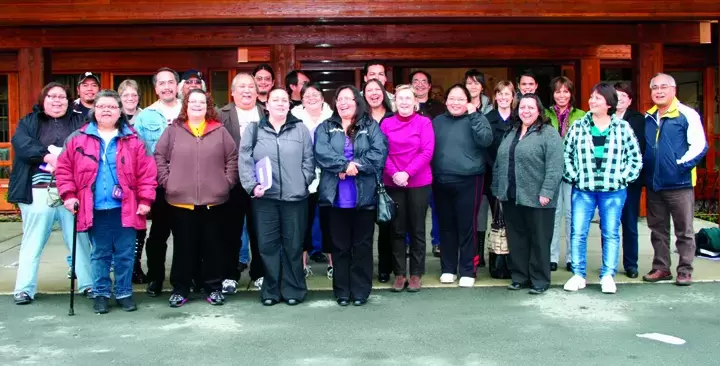The Nuu-chah-nulth Health Caucus came together for a jam-packed meeting on Jan. 21. The meeting provided information updates about the ongoing negotiations and activities surrounding the work of the First Nations Health Council, which is one of four governing structures outlined in the Tripartite First Nations Health Plan.
Nuu-chah-nulth Tribal Council President Cliff Atleo is one of three representatives appointed to the Vancouver Island regional caucus, one of five caucuses that make up the 15-member First Nations Health Council.
The health council is in the final stages of negotiating a framework agreement with Canada and British Columbia to transform how B.C. First Nations health is managed in British Columbia.
The framework agreement will eventually lead to a “BC First Nations Health Authority that will administer federal health services to First Nations in British Columbia and will lead to the development of a mandate to engage and negotiate with the Government of British Columbia and the Provincial and Regional Health Authorities,” reads the First Nations Health Council Web site (fnhc.ca).
The framework should be finalized sometime in February, Atleo reported. He said a federal election is expected in Spring and negotiators have been hammering away trying to get the agreement done before an election that might push the deal off the rails.
John Rampanen, the health governance liaison for the Vancouver Island region, spoke to the Nuu-chah-nulth Health Caucus about a workbook that will provide the First Nations Health Council with a community perspective on the development of a new governance structure for First Nations health in B.C.
Called Your Voice: A Health Partnership Workbook for BC First Nations, the workbook presents topics and questions that will inform the discussions about how this new governance structure, which will result in increased control over First Nations health, will be accountable to First Nations and how it will be supported by First Nations.
The information provided will be taken to a “Gathering of Wisdom” forum to be held at the end of February in Vancouver. The workbook was delivered to individuals at the meeting in hard copy, but it can also be completed online.
The Nuu-chah-nulth health caucus is made up of representation from each of the 14 Nuu-chah-nulth Nations. A representative from Pacheedaht was also welcomed into the circle.
The meeting was an opportunity for caucus members to also receive updates about the activities of the Nuu-chah-nulth Health Promotion & Social Development Community Engagement Hub, and the efforts being made by the Vancouver Island Health Authority to update its Aboriginal Health Plan.
Victoria Watts, the Nuu-chah-nulth Tribal Council Social Development Coordinator, distributed the Nuu-chah-nulth Health Caucus Communications Plan. The plan’s objectives are to provide Nuu-chah-nulth a clear understanding of the major changes that are to occur in B.C. on the delivery of Health Care to First Nations, and that a First Nations Health Authority will be developed over time to deliver a First Nations health system.
A number of resources have been created by the First Nations Health Council to help people understand what work is being undertaken, including a video called Implementing the Vision: BC First Nations Health Governance. Itcan be viewed at www.youtube.com/user/fnhealthcouncil
Watts has also developed a regular newsletter for the Health Promotion & Social Development Community Engagement Hub she heads up at NTC. Readers can contact her at the tribal council for copies of the newsletter. The most recent includes information on health governance, general health information, and updates from the Nuu-chah-nulth Community Health Development Workers, Matilda Atleo (southern region), Melody Charlie (central region) and Jackie Corfield (northern region).
Watts reported to the Nuu-chah-nulth Health Caucus that the Nuu-chah-nulth Community Engagement Hub is seen as a model among other hubs across the province.
Community Engagement Hubs are simply groups of First Nations communities that agree to plan, collaborate, and communicate to meet their nation’s health priorities. There are 24 community hubs representing 140 First Nations in BC.
This year, the Nuu-chah-nulth hub has worked with the Nuu-chah-nulth nations on their community health plans, where health priorities are set and a plan put in place to move forward on those priorities.
The meeting concluded with a visit from consultant Valerie Lannon who is working with the Vancouver Island Health Authority to update its Aboriginal Health Plan. It’s been five years since the last plan was written, and it was done with very little involvement from First Nations communities.
Lannon said VIHA wanted to do better on that front this time around.
The 2006 Aboriginal Health Plan was distributed, and arrangements were made to have Lannon visit the regional areas. There will be a forum held in the central region on Jan. 31, in the northern region on Feb. 14 in Gold River, and in the southern region on Feb. 23. Contact the appropriate community health development workers in your region for details.
“We are pleased that VIHA is coming to us,” said President Cliff Atleo. He said the Nuu-chah-nulth wouldn’t dwell on the fact that First Nations weren’t consulted when the 2006 Aboriginal Health Plan was developed, calling into question the accuracy of the data in the document due to that lack of consultation.
“This plan was perhaps drafted not exactly with our community information,” he said.
He explained that First Nations are working on their own health authority, but it was the intention of that new authority to create relationships with other health authorities in British Columbia and to “breathe life into the partnerships that we have embarked upon.”







